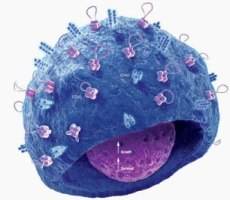

MedFriendly®


B Cell
B cells are types of white blood cells that defend the body
through a process known as humoral immunity (see below).
White blood cells are cells that help protect the body against
disease by fighting infectious organisms. B cells circulate in
the blood and lymphatic system in an immature form. The
lymphatic system is a system of vessels that drain lymph from
all over the body back into the blood. Lymph is a milky fluid that
contains proteins, fats, and white blood cells. Although only
10% of lymphocytes circulating in the blood are B cells, they
perform a crucial role in defending the body.
B cell enlarged.
FEATURED BOOK: Molecular Biology of B Cells
B cells have the ability to recognize antigens, which are substances located on the
surface of invading microorganisms (e.g., bacteria). Once B cells recognize antigens,
they become activated and travel to the spleen or lymph nodes. The spleen is an organ
next to the stomach that helps fight infection and removes and destroys worn-out red
blood cells. Lymph nodes are small egg shaped structures in the body that help fight
against infection. When the B cells reach the spleen and the lymph nodes under such
conditions, they multiply quickly into plasma B cells and memory B cells.
Plasma B cells make and release antibodies. Antibodies are types of proteins that help
stop future infections by the same antigen. Antibodies disable the antigen by binding to it
or coating it.
"Where Medical Information is Easy to Understand"™
Memory B cells do not release antibodies but they
"remember" antigens they were exposed to in the
past so they can deal with them in a quicker way when
exposed to them in the future. Upon future exposure,
memory cells turn into plasma cells, which release
antibodies to fight the antigens. This is how vaccines
(preparations given to protect the body against
infections) work. That is, vaccines expose the body to
certain types of antigens so that the memory cells can
be prepared for them if encountered in the future and
fight against them quickly. Memory B cells can survive
in the body for many years.

The process of B cells protecting the body is known as humoral immunity because the B cells release the antibodies into the fluids (also known as humors) of the body. B cells work together with other types of white blood cells known as T cells to defend the body as part of the immune system.
B cells are also known as B lymphocytes. The "B" in B cells does not stand for bone marrow (tissue that fills the openings inside of bones), which are where these cells are made. Rather, it stands for bursa of Fabricius, which an organ unique to birds where B cells mature.
B cells are also known as B lymphocytes. The "B" in B cells does not stand for bone marrow (tissue that fills the openings inside of bones), which are where these cells are made. Rather, it stands for bursa of Fabricius, which an organ unique to birds where B cells mature.















